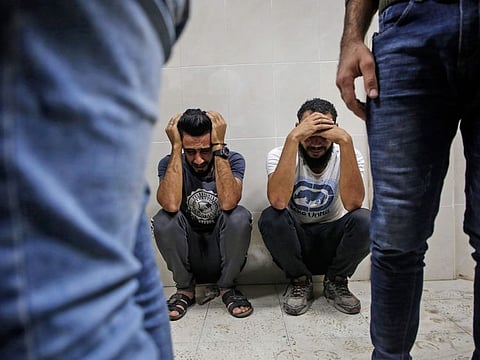As life under Israeli occupation gets worse, more Palestinians turn to suicide
Occupation increases state of helplessness, leads to higher levels of anxiety, depression

Also In This Package
Ramallah: Physical health is rapidly declining in Palestine with limited access to medical supplies and constant Israeli attacks. But a less visible illness is also plaguing the region. A September report from the Palestinian Ministry of Health indicated a 14 percent increase in suicide cases in the occupied West Bank from 2017 to 2018.
Palestine is currently facing a mental health crisis, and clinicians are struggling to combat the epidemic amid a social stigma associated with suicide.
Statistics from the Police Research and Planning Department revealed that the number of suicides in the West Bank reached 25 in 2018 compared to 22 cases in 2017.
According to the report, 218 people attempted suicide in 2018, including 61 men and 157 women.
Nour Nabris, the Mental Health Activity Manager for the Hebron project at Médecins sans Frontières (MSF), said multiple reasons can contribute to the recent rise in suicide cases.
“The political situation affects the social and economic situation and this can create an escalation in violence and add to the stress level among the population,” Nabris said, explaining that the increase in violence, deteriorating economic conditions and enduring occupation damage the Palestinian psyche.
“All of these factors can have a huge mental health impact on the population and create a level of hopelessness, a state of helplessness and lead to higher levels of anxiety and depression in the community.”
Yet for Dr. Samah Jabr, head of the mental health unit at the Ministry of Health, the reported increase in suicide cases doesn’t mean suicide is on the rise in the West Bank. “The report depends on the numbers that surface to our attention,” Jabr said. “Clinicians like myself know that many cases don’t get reported.”
Jabr mentioned that Palestine generally lacks the necessary monitoring methods to document suicide cases accurately, so an increased rate could just suggest better documentation tactics are being implemented – not that Palestinians are becoming more suicidal.
However, whether or not an increase is occurring, she maintained that even one suicide is enough reason to act.
“We don’t need an increase in rate to react,” Jabr said.
“The life of one person and the quality of life for any person is very important.”
Jabr pointed out that one of the challenges for suicide prevention here is fitting it into a Palestinian context.
Often Western non-governmental organizations are quick to classify what Palestinians feel as a mental disorder.
“There is a lot of psychosocial suffering, but not any psychological pain is a disorder,” Jabr said.
She explained how Palestinians who experience army raids, air strikes, death of family members or have their homes demolished may respond with symptoms associated with depression or anxiety but that shouldn’t automatically equate to a psychological disorder.
“That might be a very appropriate reaction to the reality of certain people,” Jabr added.
“We have to adapt it to the society,” Jabr said in combatting suicide. In Palestine’s religiously conservative culture, a significant amount of shame is attached to suicide.
“We are obliged to delve into a real discourse with religious clergy who decide what is permitted and what is sinful. Because problems like suicide or addiction, if they are perceived to be sinful, people will be quiet about them and they will grow deeper and they will get less reported,” Jabr said.
Currently, the Ministry of Health is developing a national strategy to tackle suicide by working with religious authorities. Their plan will be unveiled in a few months.
The understanding is that people in Palestine trust their religious figures and these leaders can play a powerful role in destigmatizing suicide.
Jabr is advocating for counseling courses to be part of the religious studies curriculum. She also stressed a hotline needs to be established which can better document suicide cases and provide more accurate data on the issue.
MSF’s Nabris agreed more proper reporting tactics need to be in place. She emphasized greater awareness can also reduce the present stigma in Palestine, and in turn encourage more individuals to seek help.
“We need to be able to build suitable strategies to prevent suicide and widen our campaign in fighting the stigma related to mental health so that people who are struggling can go and approach these organizations that are working within the community.”
-Rachel is a freelance journalist based in Palestine
Sign up for the Daily Briefing
Get the latest news and updates straight to your inbox



